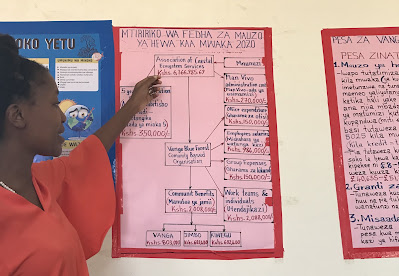[My Op Ed response article to the recent Euronews article. The published article is linked here: Euronews / Lutz S / 25 Mar 2023 / If done with integrity, carbon offsetting could be vital in the fight against climate change. The submitted version follows.]
High-Integrity Nature-Based Carbon Offsetting is Vital in the Fight Against Climate Change
By Steven Lutz, Senior Programme Officer and Blue Carbon Lead
The world is facing a climate emergency. The United Nations Intergovernmental Panel on Climate Change's landmark report published earlier this month highlights the urgent need for more ambitious action to address it. But reducing greenhouse gas emissions alone won't be enough; we must also remove carbon from the atmosphere. The report urges immediate actions to mitigate the unfolding climate crisis.
This is where market-based efforts to reduce carbon emissions come into play. Through the use of nature-based carbon offsets, we can go some way to compensate for the hard to eliminate emissions of carbon dioxide. Offsets can support climate solutions such as the conservation and restoration of forests. But they shouldn’t be seen as a get out of jail free card for polluting industries, offsets need to be accompanied by actions to reduce emissions. Carbon offsets are bought and sold on carbon markets to incentivise emissions reductions, making it economically attractive for companies to invest in emission reduction solutions.
However recent articles, such as Euronews’ Carbon offsets don't work. It's time for the EU to change its approach and The Guardian’s Revealed: more than 90% of rainforest carbon offsets by biggest certifier are worthless, analysis shows, have exposed major issues regarding the integrity of nature-based carbon offsetting. If market-based actions are not mitigating carbon emissions, the whole premise of using carbon offsets as a tool to reduce emissions becomes meaningless. In such a scenario, supporting market-based action would indeed be of little point, as it would not lead to any actual reduction in emissions.
Nature-based carbon offsets were never intended to “save us”; instead, they represent one of a suite of actions needed to address emissions. Decades of research indicate that the conservation and restoration of forests is effective in increasing the capture and storage of carbon dioxide. Therefore, developing this into a market-based mechanism has the potential to be one of the actions to address climate change, with the added benefits of helping ecosystem conservation and recovery and transferring much needed financial support to the global south.
 |
| The Vanga Blue Forest project advertises blue carbon offsets that deliver carbon, community, and biodiversity benefits. Image credit: Steven Lutz, GRID-Arendal, March 2023. |
Two shining examples from Kenya are the Mikoko Pamojacommunity-based mangrove conservation project, which Vanga Blue Foresthow carbon offset projects can equitably and justly benefit communitiesCompanies such as Microsoft prioritise the purchase of carbon offsets with multiple benefits. In Kenya, these projects help people protect mangrove forests while also benefiting the community through the sale of carbon offsets. The building of freshwater wells and the purchase of hospital equipment and schoolbooks for local children have all been made possible thanks to the carbon revenue.Financial transparency and gender equity are core components of project oversight and organisation.
A critical next step in developing high-integrity nature-based carbon offsetting is ensuring robust governance of the market. National governments are responsible for managing the benefits and risks to their citizens of engaging in the carbon market. Even with the positive Kenyan examples, the recent critical articles illustrate that a national approach may be needed to address issues such as additionality, leakage, and permanence, and to truly upscale and sustainably manage benefits. In addition to improved governance, independent verification and standards may be required to help maximise and target carbon offset benefits for communities and countries rather than just conventional market players.
And countries are taking note. The need for high-integrity coastal and marine nature-based – or “blue carbon” – offsetting was a hot topic of discussion in an open session at the recent dialogue meeting of the International Partnership for Blue Carbon, with representatives from the governments of Australia, France, Columbia, United Kingdom, Sierra Leone, Seychelles, Costa Rica, Korea, and many others participating. National forums recognising the need for enhanced nature-based carbon market governance have also recently been held in Indonesia and Papua New Guinea. provide carbon, community, and biodiversity benefits.
The recent critiques of nature-based carbon offsetting provide us with an excellent opportunity for a sober reality check on what’s happening in the market. By all means, let’s review the current projects and see if they deliver on their carbon, community and biodiversity promises. Let’s also focus on making the market work specifically for communities and countries, creating a north-south revenue stream that values nature, and where carbon offsets can play a role in its protection, if done right. The Kenyan experience illustrates that community-based carbon offsetting can work, and governments are expressing their desire for action. For the market to flourish and make real progress in the fight against climate change, it needs to hear the criticism and evolve.
Steven Lutz is a Senior Programme Officer and Blue Carbon Lead for GRID-Arendal, a Norwegian foundation and collaborating centre of the United Nations Environment Programme.


